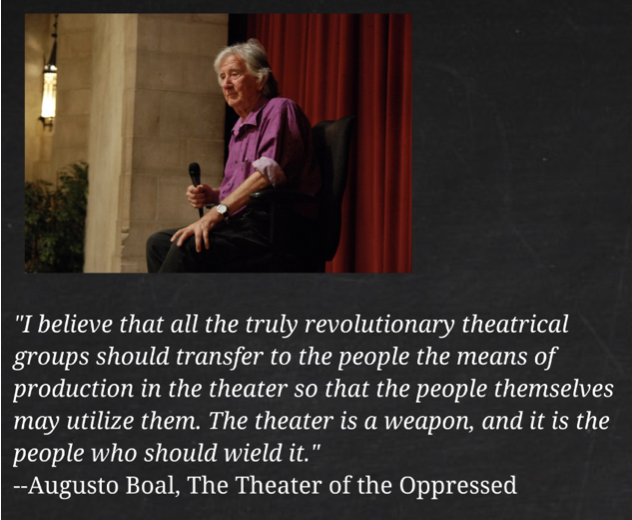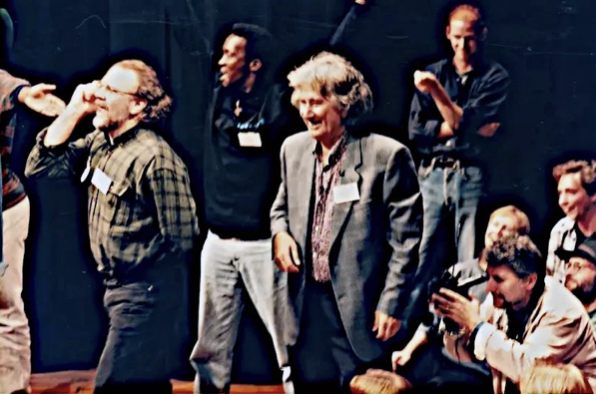Drama Tuesday - Boal and Forum Theatre
/At one level Forum Theatre is easy to define – as a practice.
In Forum Theatre, actors perform a short scene based on an event involving oppression. Spectators are encouraged to suggest and enact solutions to the problem in the scene. Image Theatre and Forum Theatre require skilled facilitators, called Jokers, to mediate between the actors and the spectators. (https://www.britannica.com/art/Forum-Theatre)
But it is important to see Forum Theatre in context.
Boal (1931-2009) was an activist with a commitment to political, economic and social change influenced by his own life circumstances and exile. He developed in a climate inspired by writers in Brazil and South America such as Paulo Fiere’s Pedagogy of the Oppressed.
The intent of Forum Theatre was political, social and personal change through directly addressing significant issue and pursuing change and revolution.
In the drama context, Boal builds on the rhetoric and practice of Brecht. Forum Theatre sets out to actively disrupt what Boal saw as the status quo of power relationships in theatre, notably the passive and “oppressed” audience. He challenged the power positioning of the actor, the script, the director and therefore, the audience.
The actor is supplanted by the spect-actor – an activist audience empowered to change the text and the outcomes of the dramatic action
The director becomes the Joker – disempowered as dictator and neutered as “objective though contradictorily could still be manipulator puppeteer
The text is changeable, reformable at the point of uttering, not just improvisationally but shaped shifted
In short, Boal’s purpose was revolutionary and radical.
Boal (and others) embed Forum Theatre as one of a series of innovations of form such as Image Theatre, Legislative Theatre, Invisible Theatre, Newspaper Theatre, Rainbow of Desire. They are all, in turn, build on a concept of freeing the body through games designed to engage and empower.
Boal in Australia
Boal was a keynote speaker at the IDEA 1995 Congress in Brisbane. He was a celebrity presence in that event and “played to packed houses” who all wanted to be part of the excitement.
I have distinct memories of watching the session late in the afternoon from the choir stalls of QPAC. Boal had insisted that the curtain be dropped on the stage and that the whole session took place on the stage. The vast stage was packed with people and Boal worked with a team of actors who had been working with him during the week of the congress. The action was played out and the substitutions of spect-actors made.
There was an enthusiastic buzz of excitement. Boal received the “rock star” treatment.
Thinking about Forum Theatre today
There are many enthusiasts. A simple Internet search reveals many examples both within the drama classroom and beyond in development contexts. It is useful to make the connections between Boal’s application and the ideas of Brecht (e.g. 1964).
There are questions to be asked about the ways that strategies such as Forum Theatre are applied and can be applied. While the techniques can be superficially used, it could be a disservice to the vision Boal (and others) had and continue to have for an empowered and different audience.
But there is fascinating potential for deep engagement through Forum Theatre and Boal’s other strategies. It is important to engage with the underlying construction of identified oppression and move beyond shallow playing out of first world angst.
Bibliography
. Augusto Boal: theatre of the oppressed. (2001). In B. Burton (Ed.), Living drama (pp. 240-247). South Melbourne, Vic.: Pearson Education Australia.
Boal, A. (1993). Theatre of the Oppressed (C. A. McBride, Trans.). New York: Theatre Communications Group.
Boal, A. (1995). The Rainbow of Desire. The Boal method of Theatre and Therapy. New York: Routledge.
Boal, A. (1996). Politics, Education and Change. In Drama, culture and empowerment (pp. dk-dk). Brisbane: IDEA Publications.
Boal, A. (2011). Juegos para actores y no actores. Barcelona: Alba.
Brecht, B. (1964). A Short Organum for the Theatre. In J. Willet (Ed.), Brecht on Theatre: The Development of an Aesthetic, 1st ed. (pp. 233-246). New York: Hill and Wang.








